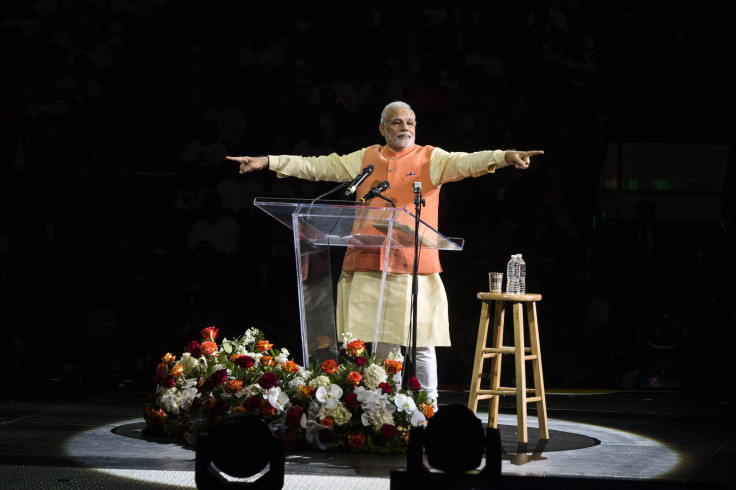Time Person Of The Year: Narendra Modi Wins Reader Poll

In what may be seen as a sign of his growing prominence on the global stage, Time magazine announced that India’s Prime Minister Narendra Modi had won the ‘Person of the Year’ title based on a readers' poll, comfortably edging past protesters in the U.S. city of Ferguson and Joshua Wong, the student leader at the head of the recent protests in Hong Kong.
"In the final tally, Modi received more than 16% of the almost 5 million votes cast. Protesters who took to the streets in Ferguson, Mo., after the police shooting of an unarmed black teenager finished second with 9%. Hong Kong protest leader Joshua Wong, Nobel Peace Prize-winner Malala Yousafzai and the doctors and nurses treating Ebola rounded out the top five," Time magazine said. "A majority of votes, 60%, came from desktop computers. Just over 35% came from mobile devices, and 4.5% of readers voted on tablets," it added.
Modi, who in May formed the first majority government in India since 1984, won with 16.2 percent of the vote, while Ferguson protesters secured 9.2 percent and Wong got 7 percent. 2014 Nobel Peace Prize winner and UK-based teenage Pakistani human rights activist Malala Yousafzai, Russian President Vladimir Putin, U.S. President Barack Obama and German Chancellor Angela Merkel were far behind Modi with less than 5 percent of the votes.
To be sure, this is only an online poll and Time’s editors will anoint the magazine's much-watched Person of the Year. Modi is not in the running on this list and the editors’ choice will be announced on Dec. 10.
Modi is not the first Indian politician to have a won a major Time magazine poll in recent times. In April, just as India was going to the polls, former chief minister of Delhi state and activist-turned-politician Arvind Kejriwal had won the readers’ poll for the 2014 Time 100, edging past Modi in the magazine’s “annual list of people who influenced the world this past year, for better or for worse.”
Kejriwal and Modi were significantly ahead of other global celebrities like Katy Perry, Justin Bieber and Rihanna, as according to the magazine itself, the poll turned out to be a competition between leading politicians competing in the Indian elections. It is another matter, however, that while Modi’s Bharatiya Janata Party secured more than half of the 543 seats in India's lower house of parliament, Kejriwal’s Aam Aadmi Party could manage just four.
Time magazine had noted how “the power of Modi’s polarization” was also on display, which it also noted was not a reflection of how India was likely to vote in the ensuing elections. In fact, ever since the communal riots of 2002 in India’s Gujarat state, which Modi, who was then the state's chief minister, allegedly did not stop for political reasons, he has become an increasingly polarizing figure in India’s politics. In 2012, Modi was acquitted in the case as an investigation team formed by India's Supreme Court found no evidence against him.
After Kejriwal won the Time poll, several publications including the Hindustan Times noted how -- since the year 2000, when Indian movie actor Amitabh Bachchan won an online popularity contest conducted by the BBC -- Indians have dominated such web polls.
“In polls where every click means a vote, sceptics see an army of Internet warriors sitting before computers across India, ensuring their favourites come out winners. After all, India has the third largest number of Internet connections after US and China. And not every online poll has the technology to ensure that votes are cast from separate IP addresses,” the newspaper said.
In fact, in India's 2014 election, social media played a significant role. "The three American social media giants - Facebook, Twitter and Google - have emerged as a major player in the ongoing general elections in India, with political parties and candidates competing with each other in breaking the news, spreading their message through these outlets in addition to those via the traditional media," the Press Trust of India had noted in May, just ahead of the results.
CNN had noted a little earlier: "A bevy of politicians, who, at first sight, seem antiquated and traditional in their flowing kurtas and Gandhi caps are turning to social networking sites to engage Internet-savvy first time voters. Having an official YouTube channel or an active Facebook page is now as important as holding mass rallies and plastering candidates' faces on billboards."
And this trend is only likely to grow as India is set to have the second-largest Internet user base by the end of this month, as a November report in the International Business Times had noted. By the end of December, India is likely to have 302 million Internet users, second only to China and ahead of the U.S., signaling a growth of 32 percent over last December’s figure, when the total Internet user base in the country stood at 213 million.
© Copyright IBTimes 2024. All rights reserved.











